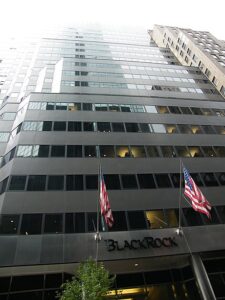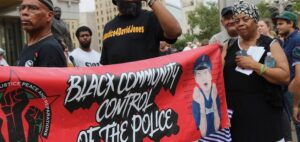 ELLEN BROWN, ellenhbrown at gmail.com, @ellenhbrown
ELLEN BROWN, ellenhbrown at gmail.com, @ellenhbrown
Brown is an attorney, founder of the Public Banking Institute, and author of twelve books, including the best-selling The Web of Debt: The Shocking Truth About Our Money System and How We Can Break Free.
She just wrote the piece “Meet BlackRock, the New Great Vampire Squid,” which states: “To most people, if they are familiar with it at all, BlackRock is an asset manager that helps pension funds and retirees manage their savings through ‘passive’ investments that track the stock market. But working behind the scenes, it is much more than that. BlackRock has been called ‘the most powerful institution in the financial system,’ ‘the most powerful company in the world’ and the ‘secret power.’ It is the world’s largest asset manager and ‘shadow bank,’ larger than the world’s largest bank (which is in China), with over $7 trillion in assets under direct management and another $20 trillion managed through its Aladdin risk-monitoring software. BlackRock has also been called ‘the fourth branch of government’ and ‘almost a shadow government’, but no part of it actually belongs to the government. Despite its size and global power, BlackRock is not even regulated as a ‘Systemically Important Financial Institution’ under the Dodd-Frank Act, thanks to pressure from its CEO Larry Fink, who has long had ‘cozy’ relationships with government officials.
“BlackRock’s strategic importance and political weight were evident when four BlackRock executives, led by former Swiss National Bank head Philipp Hildebrand, presented a proposal at the annual meeting of central bankers in Jackson Hole, Wyoming, in August 2019 for an economic reset that was actually put into effect in March 2020. Acknowledging that central bankers were running out of ammunition for controlling the money supply and the economy, the BlackRock group argued that it was time for the central bank to abandon its long-vaunted independence and join monetary policy (the usual province of the central bank) with fiscal policy (the usual province of the legislature). They proposed that the central bank maintain a ‘Standing Emergency Fiscal Facility’ that would be activated when interest rate manipulation was no longer working to avoid deflation. The Facility would be deployed by an ‘independent expert’ appointed by the central bank.
“The COVID-19 crisis presented the perfect opportunity to execute this proposal in the U.S., with BlackRock itself appointed to administer it. In March 2020, it was awarded a no-bid contract under the Coronavirus Aid, Relief, and Economic Security Act (CARES Act) to deploy a $454 billion slush fund established by the Treasury in partnership with the Federal Reserve. This fund in turn could be leveraged to provide over $4 trillion in Federal Reserve credit. While the public was distracted with protests, riots and lockdowns, BlackRock suddenly emerged from the shadows to become the ‘fourth branch of government,’ managing the controls to the central bank’s print-on-demand fiat money. How did that happen and what are the implications? …”
Brown concludes: “If the corporate oligarchs are too big and strategically important to be broken up under the antitrust laws, rather than bailing them out they should be nationalized and put directly into the service of the public. At the very least, BlackRock should be regulated as a too-big-to-fail Systemically Important Financial Institution. Better yet would be to regulate it as a public utility. No private, unelected entity should have the power over the economy that BlackRock has, without a legally enforceable fiduciary duty to wield it in the public interest.”
Brown’s other books include The Public Bank Solution: From Austerity to Prosperity and most recently, Banking on the People: Democratizing Money in the Digital Age.
